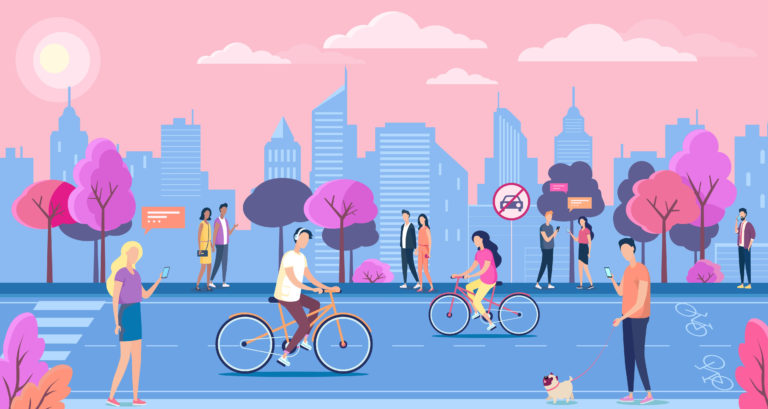HIGHWAY HEADQUARTERS
Cities & Our State of Mind: Why they're not a great match
Highway Blog Post - Friday 05 November 2021

(2 minute read)
Living in a city and can’t figure out why you’re feeling down? It might be time to consider the way the city itself is impacting your quality of life.
Sure, cities can be dazzling. They’re large, expansive and seem to hold endless opportunities. So many of us live in cities for this exact reason: they provide opportunities that other places might not. The rapid pace of life, the constant change of scenery and the endless buzz of people can be exciting. However, there is another side to city life – and life in the suburbs – that is not often spoken about. Life in a city can be lonely, isolating and leave you feeling stressed. If you’re feeling this way, know this:
1. Cities weren’t designed for mental wellbeing
Yes, cities are great for concentrating people in one place to work, but their design isn’t the best for our state of mind. Wide concrete roads carve up the suburbs, spreading us out, isolating us. As apartment blocks rise, trees fall, and our access to greenery diminishes. And research clearly shows that isolation and distance from nature don’t serve us well.
2. You’re not alone in feeling alone
In cities, loneliness is widespread. Some of the most ‘developed’ countries are grappling with staggering rates of loneliness. Japan has just appointed a Minister of Loneliness to address this exact issue. The glaring connection between city life and loneliness is hard to ignore.
3. More and more city dwellers are closing themselves off.
Urban theorist Nan Ellin suggests the original purpose of a city was to give people a sense of safety – the city’s walls created a protective barrier against the outside world. Now, Ellin argues, modern cities have become associated with a sense of ever-present fear. People are creating their own private castles, armed with alarm systems, gates and guard dogs. More and more, people detach themselves from others in the name of security, which only fuels a sense of isolation.
4. We need social connection.
Scientists are showing more and more, we need to feel connected to others. There is a reason why the brain experiences loneliness as pain: we shouldn’t be alone, at least not for too long.
5. The city is too stimulating.
It is exciting, but at the same time the constant hum of city overstimulates your brain, leaving you drained and on edge. At times, it feels like everything is whizzing by, and you can’t control the anything around you.
You’re not alone if you feel the weight of the city pressing down on you. Finding ways to connect to others, creating a quiet space, getting into nature, and reaching out to people in your life can help alleviate the loneliness the city perpetuates.
If you are not sure who to talk to, Highway creates spaces for you to connect with other people your age, from the comfort of your own home.
Remember we are always here to help.
Stay safe.
Easing into Life Out of Lockdown
Highway Blog Post - Friday 22 October 2021

(1 minute read)
As lockdown restrictions start to ease for what seems like the first time in forever, there is a lot of excitement about seeing friends, going out and having a holiday period that resembles celebrations pre COVID-19.
We’ve all had to alter our lives in some way to protect ourselves and our communities through the pandemic, so while it’s exciting to finally have more freedom, it’s very normal that this excitement is tinged with nerves. The protection systems we’ve created and held onto so tightly are now no longer needed, but they can be very hard to let go of.
Socialising can be tiring at the best of times, but when you’ve only had yourself and/or your family, partner, or housemates for company for the past few months. It’s downright exhausting.
Change requires adaptation, so we’ve compiled some tips for you while you’re navigating life out of lockdown.
1. Acknowledge your fear.
We’ve been dealing with a pandemic for the best part
of two years now, so it’s totally normal to feel anxious or afraid of what may happen once our states open up. Understanding that everyone has different tolerance levels to risk and it’s okay to be cautious about restrictions changing is key.
2. It’s okay to say no.
You don’t need to accept every invitation to every picnic, beer garden hangout or volleyball match on the beach, especially if constant socialisation will wear you down. As vaccination rates continue to climb, it’s unlikely we’ll see prolonged lockdowns again, so there will be plenty of time to
catch up with everyone – you don’t need to fit months of catch-ups into the first few weeks.
3. Ease into it.
Be patient with yourself and take this adjustment period at your own pace. Unlike when we’re thrown into a snap lockdown and your life is turned upside down all at once, as we come out of lockdown you have the time to turn your life right-side up piece by piece. There is no rush.
4. Focus on what’s important to you.
Have your priorities shifted during a lockdown? You can bet that most peoples’ have. If the things that were important to you before lockdown hold less weight now, that’s okay! Focus on what you’ve learnt about yourself and your priorities as we emerge from lockdown.
5. Keep routines.
Do you know the things that got you through lockdown? Daily walks, cooking a meal, creating time for quality rest – don’t abandon them as soon as restrictions lift. You’ll probably find that keeping these healthy habits will go a long way in dealing with any uncertainty that arises over the next few months. Even though the lockdowns are easing, we’re still experiencing a global pandemic. Remember to let others know how you feel. We’re always here to listen.
Soon enough, things will feel normal again. Until then, stay safe.
Would you like to get inspired about your life?
Join a Highway session today.
If you would like to explore what’s going on for you today, then just jump on! You will be welcomed to a safe, warm, non-judgemental space where you can be yourself and uncover what is important to you.





